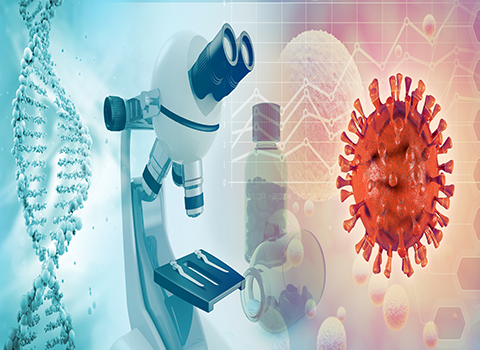1st June 2020

Depuis la découverte du coronavirus SARS-CoV-2, l’Institut Pasteur a été en première ligne pour apporter une réponse à la pandémie soit par le biais des initiatives menées par son réseau mondial, soit en partenariat avec d’autres organisations
L’Institut Pasteur à Paris et le Réseau International des 32 Instituts Pasteur sont mobilisés massivement partout dans le monde pour répondre par la science à la pandémie d’infection par le coronavirus SARS-CoV-2. Cette mobilisation regroupe actuellement plusieurs centaines de personnes de l’Institut Pasteur à Paris et plusieurs équipes du Réseau dans différents pays. Une Task force Coronavirus, lancée par l’Institut Pasteur dès janvier dernier, lance et coordonne de nouvelles recherches pasteuriennes sur le Covid-19. Plusieurs autres projets sont également en cours de réalisation en partenariats ou avec le soutien d’organismes tiers.
L’ensemble de ces projets se répartit désormais en huit champs d’investigation :
- Connaissance du virus et de sa pathogénèse
- Développement d’outils pour la recherche
- Recherche épidémiologique ou socio-épidémiologique
- Développement d’outils diagnostiques
- Prophylaxie et candidats vaccins
- Recherche thérapeutique
- Modélisation
- Bioinformatique
Voir l’état de lieux des travaux engagés ici.
Parmi ceux-ci, on peut noter plus particulièrement les projets ci-dessous :
Pour comprendre l’évolution de la population virale du SARS-CoV-2 chez l’hôte au cours de la maladie, en relation avec l’infectiosité du virus et l’établissement de la réponse immunitaire humorale (par anticorps). Cette connaissance est importante pour identifier les tendances de progression de la maladie et donner des clés pour mieux gérer la prise en charge des patients et leur sortie.
Le cycle de réplication des coronavirus dépend de nombreuses interactions protéine-protéine, d’une part entre les protéines virales pour générer des complexes protéiques fonctionnels, et d’autre part avec des protéines de l’hôte pour inhiber la réponse immunitaire innée. L’identification de ces interactions, qui sont essentielles à l’infection virale, peut révéler des mécanismes moléculaires impliqués dans la pathogenèse, et identifier les points faibles du virus qui pourraient être ciblés d’un point de vue thérapeutique.
L’étude de la transmission du SARS-COV-2 de l’homme aux animaux domestiques
L’infection par le SARS-CoV-2 présente des défis sans précédent liés au contrôle et à la prévention de cette maladie virale dans le monde. Si l’émergence du virus est bien documentée, d’importantes questions sur la transmissibilité de la maladie restent sans réponse, en particulier concernant les animaux de compagnie. Des chercheurs de l’Institut Pasteur en collaboration avec des équipes de l’École Nationale Vétérinaire d’Alfort, ont testé plusieurs chats et chiens ayant été en contact étroit avec des humains testés positifs au SARS-CoV-2 ou présentant des signes cliniques de la maladie Covid-19. Aucun animal de cette étude n’était porteur du virus.
Isoler et caractériser les anticorps humains neutralisant le SARS-CoV-2.
Objectif : comprendre les mécanismes des réponses anticorps dirigées contre le SARS-CoV-2 et étudier comment celles-ci peuvent participer à l’élimination du virus chez les individus infectés. Il s’agit de comprendre les réponses anticorps des lymphocytes B mémoires anti- SARS-CoV-2 à un niveau moléculaire et fonctionnel (les lymphocytes B sont les cellules immunitaires qui fabriquent les anticorps). Les cellules B mémoires se développant après une première infection possèdent une longue durée de vie et sont en effet capables d’intervenir très rapidement et efficacement en cas de réinfection. Cette recherche vise à utiliser les découvertes qui seront faites pour développer un traitement reposant sur l’utilisation d’anticorps humains neutralisants (immunothérapie).
Objectif : Le projet DrugDesign_SARS2 a pour objectif de trouver des médicaments antiviraux efficaces contre le SARS-CoV-2 qui ciblent les protéines indispensables au cycle du virus. Le projet regroupe l’expertise de plusieurs laboratoires et plateformes du Réseau International des Instituts Pasteur (Paris, Lille, Rome). L’objectif de l’étude est d’examiner un grand nombre de composés le plus rapidement possible grâce aux techniques de criblage à haut débit. Dans un second temps, l’objectif sera d’améliorer, par des procédés chimiques et à l’aide des données obtenues par les différents laboratoires, les composés sélectionnés.
Peuvent aussi être mentionnés les projets de recherche menés dans le contexte des actions d’Aviesan (l’Alliance pour les sciences de la vie et de la santé), via le consortium REACTing avec 20 projets de recherche soutenus pour lutter contre l’épidémie dont 3 projets portés par l’Institut Pasteur :
1) Identification et la caractérisation d’anticorps monoclonaux humains neutralisants le 2019-nCoV avec un potentiel développement vers des candidats vaccins.
2) Établissement du profil des anticorps chez les patients en convalescence et élaboration d’un test sérologique appliqué à une enquête épidémiologique chez les personnes exposées au SRAS-Cov-2.
3) Évolution du SRAS-Cov-2 chez l’hôte humain au cours de l’infection et de la réponse humorale.
De nombreux projets de recherche ont aussi été financés par la Commission Européenne pour lutter contre l’épidémie et l’Institut Pasteur contribue aux deux consortia ci-dessous.
RECOVER – Rapid European COVID-19 Emergency Research Response
Ce projet de recherche implique 10 partenaires internationaux et comprend plusieurs volets dont des études épidémiologiques, des études cliniques, et des études en sciences sociales.
RECOVER abordera les questions les plus urgentes pour la santé des patients et la santé publique en menant des recherches médicales pour combler les principales lacunes dans les connaissances, comme celles concernant les meilleures approches pour prévenir la propagation de la maladie et les interactions du virus avec l’hôte humain. De cette manière, RECOVER fournira des preuves scientifiques qui pourront être utilisées par les décideurs cliniques, de santé publique et politiques sur la meilleure façon de protéger la santé et de sauver des vies. Ces efforts viendront compléter les recherches en cours en Chine et dans d’autres parties du monde.
I-MOVE-COVID-19 – Réseaux européens de soins primaires et des hôpitaux
Le consortium I-MOVE-COVID-19 vise à obtenir des informations épidémiologiques et cliniques sur les patients atteints de COVID-19 ainsi que des informations virologiques sur le SRAS-CoV-2, par (a) la mise à disposition d’une plateforme de surveillance souple (adaptable à la situation épidémiologique), (b) des études de recherche et (c) l’évaluation des interventions de santé publique (par exemple, vaccination, antiviraux), afin de contribuer à la base de connaissances, d’orienter la prise en charge des patients et d’informer la réponse des systèmes de santé publique. Pour ce faire, le réseau européen de surveillance de la grippe (I-MOVE), qui existe depuis longtemps, sera adapté et étendu pour inclure le COVID-19. Ce réseau comprend des réseaux de soins primaires, des hôpitaux et des centres de référence de laboratoires nationaux dans dix pays de la Région européenne de l’OMS.
Le 19 mars 2020, le CEPI (Coalition for Epidemic Preparedness Innovations) annonce le financement d’un montant de 4,3 millions d’€ du projet de développement d’un vaccin contre le SRAS-CoV-2 émergent. Ce projet, porté par l’Institut Pasteur dans le cadre d’un consortium avec Themis et l’université de Pittsburgh / Center for Vaccine Research (CVR), est fondé sur l’utilisation du vaccin contre la rougeole comme vecteur de ce candidat vaccin.
Pour en savoir plus sur l’Institut Pasteur, cliquez sur le lien suivant : https://www.pasteur.fr/en
Institut Pasteur driven initiatives to address the pandemics

Since the discovery of the SARS-CoV-2 coronavirus, Institut Pasteur was at the forefront in providing pandemic response either through initiatives driven by its global network or in partnership with other organisations.
The Institut Pasteur in Paris and its International Network of 32 institutes have been extremely active worldwide in responding with science to the pandemic caused by the SARS-CoV-2 coronavirus. Its response currently involves hundreds of people at the Institut Pasteur in Paris and several teams in the network in other countries. A coronavirus task force was set up by the Institut Pasteur in January to launch and coordinate new COVID-19 research by its teams. Many projects are also being carried out in partnerships or with the support of other organizations. Here are the research projects now under way, several others are set to begin shortly.
These projects are in the following fields:
- Knowledge of the virus and its pathogenesis
- Development of research tools
- Epidemiological research, social epidemiology
- Development of diagnostic tools
- Prophylaxis and vaccine candidates
- Therapeutic research
- Modeling
- Bioinformatics
Here is an inventory of the current research projects.
Among them we can mention the following exemples:
Evolution of SARS-CoV-2 in humans during infection and the antibody immune response.
To understand the evolution of the SARS-CoV-2 virus population in the host during disease, in relation to the infectivity of the virus and the establishment of the humoral (antibody) immune response. This knowledge is important to identify trends in disease progression and provide keys to better manage patient management and discharge.
The coronavirus replication cycle depends on several protein-protein interactions, some between viral proteins to generate functional protein complexes and others with host proteins to inhibit the innate immune response. Identifying these interactions, which are essential for viral infection, can reveal the molecular mechanisms involved in pathogenesis and identify weak points in the virus that may be potential therapeutic targets.
Study on transmission of SARS-COV-2 from humans to pets
SARS-CoV-2 infection presents unprecedented challenges in the control and prevention of this viral disease worldwide. While the emergence of the virus has been well documented, important questions about the transmissibility of the disease remain unanswered, particularly with respect to pets. Institut Pasteur researchers, in collaboration with teams from the École Nationale Vétérinaire d’Alfort, have tested several cats and dogs that have been in close contact with humans who tested positive for SARS-CoV-2 or showed clinical signs of Covid-19 disease. None of the animals in this study was a carrier of the virus.
Isolating and characterizing the human antibodies that neutralize SARS-CoV-2
Aim: to elucidate the mechanisms behind the antibody responses to SARS-CoV-2 and investigate the role they may play in eliminating the virus in infected individuals. The idea is to improve our understanding of the antibody responses of anti-SARS-CoV-2 memory B lymphocytes at molecular and functional level (B lymphocytes are the immune cells that produce antibodies). The memory B cells that develop after an initial infection have a long life span and are capable of intervening rapidly and effectively in the event of reinfection. The project aims to harness the discoveries made to develop a treatment based on the use of human neutralizing antibodies (immunotherapy).
Aim: The DrugDesign_SARS2 project aims to find effective antiviral drugs against SARS-CoV-2 that target proteins essential to the viral cycle. The project brings together the expertise of several laboratories and platforms of the Institut Pasteur International Network (Paris, Lille, Rome). The aim of the study is to examine a large number of compounds as quickly as possible using high throughput screening techniques. In a second round, the objective will be to improve the selected compounds, by chemical processes and using the data obtained by the various laboratories.
One can also mention research projects supported in the context of Aviesan actions (Alliance pour les sciences de la vie et de la santé – French Alliance for Life Science and Health), via the REACTing consortium with 20 research projects to fight against the epidemic including 3 projects lead by the Institut Pasteur :
- Identification and characterization of human monoclonal antibodies neutralizing 2019-nCoV with potential development towards vaccine candidates.
- Establishment of antibody profiles in convalescent patients and development of a serological test applied to an epidemiological investigation in persons exposed to SARS-Cov-2.
- Evolution of SARS-Cov-2 in the human host during infection and humoral response.
Among the numerous research projects funded by the European Commission, to fight the COVID-19 epidemic, the Institut Pasteur contributes to 2 consortia described below.
RECOVER – Rapid European COVID-19 Emergency Research Response
RECOVER will address the most urgent questions for patient and public health by conducting medical research to address key knowledge gaps, such as those about best approaches to prevent further spread of the disease and about the virus interactions with the human host. In this way, RECOVER will provide scientific evidence that can be used by clinical, public health and policy decision-makers about how best to protect health and save lives. These efforts will complement ongoing research in China and other parts of the world.
I-MOVE-COVID-19 – European primary care and hospital networks
The I-MOVE-COVID-19 consortium aims to obtain epidemiological and clinical information on patients with COVID-19 as well as virological information on SARS-CoV-2, through (a) provision of a flexible surveillance platform (adaptable to the epidemiological situation), (b) research studies and (c) evaluation of public health interventions (e.g. vaccination, antivirals), in order to contribute to the knowledge base, guide patient management, and inform the public health response. This will be achieved through adaptation and expansion of the existing, long-running, Europe-wide influenza surveillance network (I-MOVE) to include COVID-19. The network includes primary care networks, hospitals, and national laboratory reference centres in 10 countries across the WHO European Region.
Finally, CEPI collaborates with the Institut Pasteur, in a consortium to develop a COVID-19 vaccine
CEPI, the Coalition for Epidemic Preparedness Innovations, added an eighth Covid-19 vaccine candidate to its portfolio. CEPI will invest an initial US$4.9 million in a partnering agreement with the Institut Pasteur-led consortium that will include Themis and the University of Pittsburgh to develop a vaccine candidate against Covid-19 based on measles-vector technology.
For more information about the Institut Pasteur: https://www.pasteur.fr/en
Europe's top health start-ups take centre stage: EIT Health Catapult winners are revealed at HLTH Europe

2025 Catapult programme winners announced.
Finding Europe’s next healthtech leaders: Insights from Antoine D’Hollander

Insights from Antoine D’Hollander, Capricorn Partners.
EIT Health supports 17 promising deep tech start-ups bridge the ‘Valley of Death’

Providing start-ups with the right support.